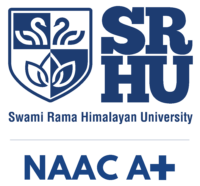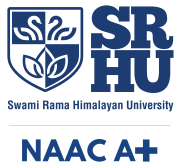Policy for Adoption of Sustainable Development Goals
November 7, 2025 2025-11-25 9:56Policy for Adoption of Sustainable Development Goals
Policy for Adoption of Sustainable Development Goals
| Approved | Board of Management on 22nd September, 2018 |
| Notification | Notified by Registrar vide notification No. SRHU/Reg/OO/2018-86 (i) dated 28th September, 2018 |
| Next Review | Review of the policy will be done in accordance with the parameters laid down by the Government of India as and when required. |
- Short Title and Commencement
- This policy shall be called the “Policy for Adoption of Sustainable Development Goals” into University Operations.
- This policy shall come into force from the date of approval of the Board of Management of the University.
- Purpose This policy sets out SRHU’s commitment to strategically integrate SDGs into teaching-learning, research, governance, campus operations, and external partnerships—thus positioning the University as a sustainable institution.
- Scope This policy applies to all academic programs at the undergraduate, postgraduate, and doctoral levels, as well as to faculty members engaged in teaching and research. It also extends to administrative units, including governance bodies and operations or infrastructure teams. Additionally, the policy encompasses external stakeholders such as community outreach units, industry collaborators, and government partnerships to ensure holistic integration of UNSDG principles across all domains of the University.
- Strategies for Integration of SDGs into University Operations
- Teaching & Learning
- Embed SDG awareness and content within core curricula.
- Offer electives and Value Added Courses (VAC) on sustainability, global citizenship, and social innovation.
- Use experiential learning aligned to SDGs.
- Research & Innovation
- Prioritize interdisciplinary research targeting SDG-related challenges.
- Incentivize faculty and student-led research with socio-economic impact.
- Publish and disseminate results aligned with SDG Publishers Compact guidelines.
- Governance & Leadership
- Establish an SDG Cell or Centre of Excellence for Sustainability.
- Integrate SDG alignment into strategic planning and annual performance metrics.
- Campus Operations & Sustainability
- Introduce green campus infrastructure like rain-water harvesting, solar energy, and zero-plastic zones.
- Implement energy-efficient, resource-saving administrative systems.
- Adopt sustainability procurement and waste management aligned with SDGs.
- Collaborations & Community Engagement
- Forge MoUs with NGOs, UN agencies, and industry partners to co-design SDG-driven programs.
- Engage local communities through rural clinics, clean-energy drives, and education initiatives.
- Teaching & Learning
- SDGs Implementation
- SDG Committee: Senior leadership to oversee alignment, execution and drives of curriculum integration, awareness and data tracking.
- Learning and Development Centre in collaboration with IQAC: Train teachers on sustainable pedagogy.
- Infrastructure Development and Maintenance Department: Oversee sustainable campus implementation.
- Collaboration & Outreach Activities: Manage collaborations and community outreach activities.
- Key Performance Indicators (KPIs) & Monitoring Mechanism
- Teaching & Learning: % of programs embedding SDG content, number of SDG-related courses, training imparted in emerging areas.
- Research: Number of SDG-aligned publications and grants.
- Governance: SDG Cell meetings, resource allotment to SDG units.
- Campus Operations: Energy saved, water harvested and reused, waste recycled.
- Partnerships & Outreach: Active MoUs and community engagement outreach activities.
- Policy Review The implementation of SDG activities shall be periodically reviewed by the SDG Committee to ensure alignment with policy objectives. A comprehensive review of the policy will be done in accordance with the parameters laid down by the Government of India as and when required.

